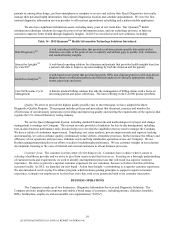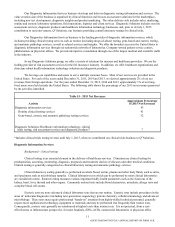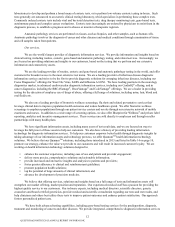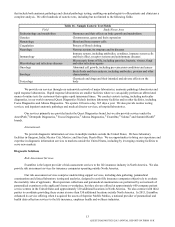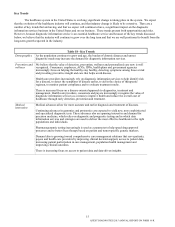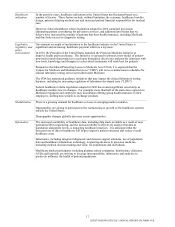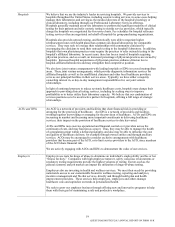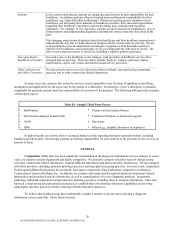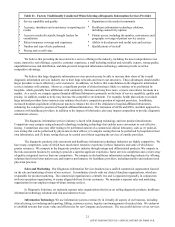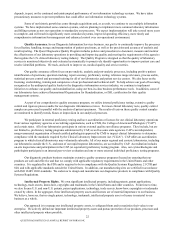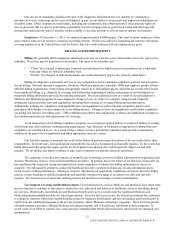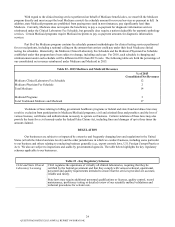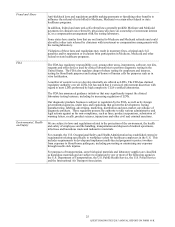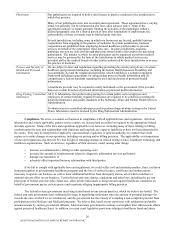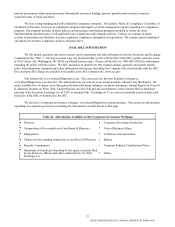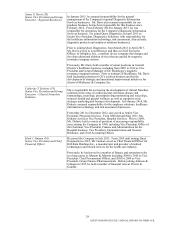Quest Diagnostics 2015 Annual Report Download - page 23
Download and view the complete annual report
Please find page 23 of the 2015 Quest Diagnostics annual report below. You can navigate through the pages in the report by either clicking on the pages listed below, or by using the keyword search tool below to find specific information within the annual report.
19
Hospitals We believe that we are the industry's leader in servicing hospitals. We provide services to
hospitals throughout the United States, including esoteric testing services, in some cases helping
manage their laboratories and serving as the medical directors of the hospital's histology or
clinical laboratory, including through our Professional Laboratory Services offerings.
Hospitals generally maintain an on-site laboratory to perform the significant majority of clinical
testing for their patients and refer esoteric testing to outside service providers, which typically
charge the hospitals on a negotiated fee-for-service basis. Fee schedules for hospital reference
testing services often are negotiated on behalf of hospitals by group purchasing organizations.
Hospitals also provide outreach testing, and historically were able to negotiate higher
reimbursement rates with health plans than commercial clinical laboratories for comparable
services. They may seek to leverage their relationships with community clinicians by
encouraging the clinicians to send their outreach testing to the hospital's laboratory. In addition,
hospitals that own physician practices may require the practices to refer outreach testing to the
hospital's affiliated laboratory. In recent years, there has been a trend of hospitals acquiring
physician practices, and as a result, an increased percentage of physician practices are owned by
hospitals. Increased hospital acquisitions of physician practices enhance clinician ties to
hospital-affiliated laboratories and may strengthen their competitive position.
We also have joint venture arrangements with leading hospitals or IDNs in several metropolitan
areas. These joint venture arrangements, which provide diagnostic information services for
affiliated hospitals as well as for unaffiliated clinicians and other local healthcare providers,
serve as our principal facilities in their service areas. Typically, we have either a majority
ownership interest in, or day-to-day management responsibilities for, our joint venture
relationships.
In light of continued pressure to reduce systemic healthcare costs, hospitals may change their
approach to providing clinical testing services, including by seeking ways to improve
profitability or to better utilize their laboratory capacity. We believe that our combination of
services positions us to be an attractive partner for hospitals, offering a full range of strategic
relationships.
ACOs and IDNs An ACO is a network of providers and facilities that share financial risk in providing or
arranging for the provision of healthcare. An IDN is a network of providers and facilities
working together in providing or arranging for the provision of healthcare. ACOs and IDNs are
increasing in number and becoming more important constituents in delivering healthcare
services; their impact on the provision of healthcare services to date has varied.
ACOs and IDNs may exercise operational and financial control over providers across the
continuum of care, and may function as a payer. Thus, they may be able to manage the health
of a population group within a defined geography, and also may be able to influence the cost
and quality of healthcare delivery, for example through owned entities and through ancillary
services. ACOs may be encouraged to consider exclusive arrangements with healthcare
providers that become part of the ACO, or to limit service providers to the ACO, since members
of the ACO share financial risk.
We are actively engaging with ACOs and IDNs to demonstrate the value of our services.
Employers Employers use tests for drugs of abuse to determine an individual's employability and his or her
“fitness for duty.” Companies with high employee turnover, safety conscious environments or
regulatory testing requirements provide the highest volumes of testing. Factors such as the
general economy and job market can impact the utilization of drugs-of-abuse testing.
Employers also are investing in health and wellness services. We meet their needs by providing
nationwide access to our customizable biometric wellness testing, reporting and analytics,
incentive management and flu shot services, directly and through health plan and health
improvement providers. These services help employers, employees and others manage
healthcare costs and capitalize on trends in personalized health.
We seek to grow our employer business through offering new and innovative programs to help
them with their goal of maintaining a safe and productive workplace.
QUEST DIAGNOSTICS 2015 ANNUAL REPORT ON FORM 10-K



